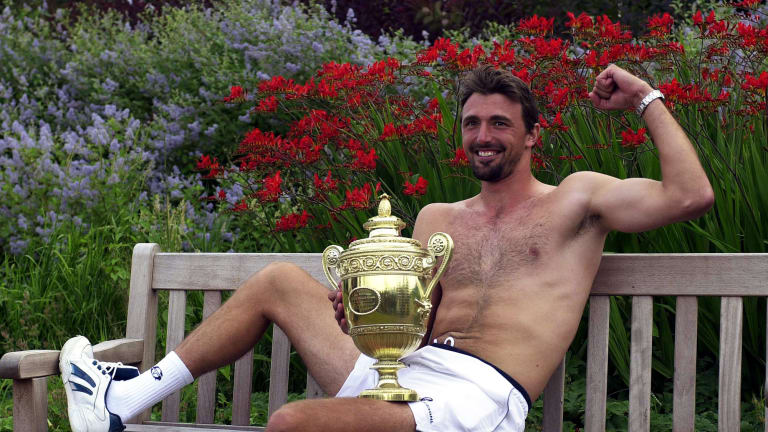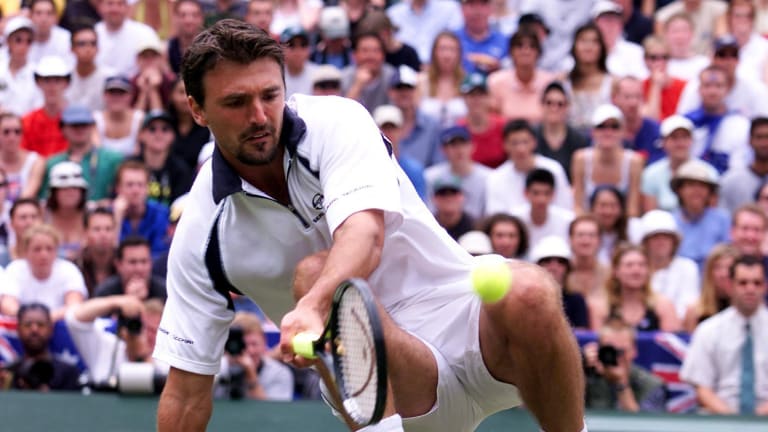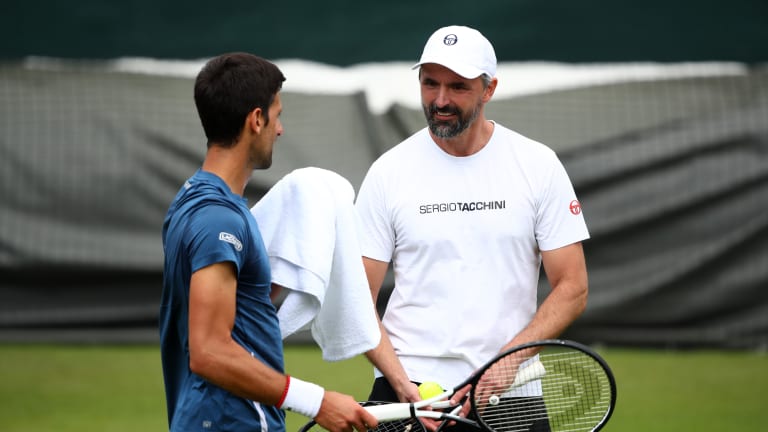The Three Gorans: Ivanisevic to be enshrined in Tennis Hall of Fame
By Steve Flink Jul 14, 2021At 74, Life is Busy and Complete for Stan Smith
By Steve Flink Jun 21, 2021Jane Brown Grimes: The Most Scholarly Hall of Famer
By Steve Flink Jun 17, 2021The Craftsman: Butch Buchholz and the rippling effects of his Miami Open vision
By Steve Flink Jun 16, 2021The Second Act: Gigi Fernandez's fascinating post-tour career
By Steve Flink Jun 15, 2021"Done with my crashout": Naomi Osaka ready for reset after losing Madrid opener
By Baseline Staff Apr 24, 2025REPORTS: Carlos Alcaraz to announce Madrid withdrawal amid injury struggles
By TENNIS.com Apr 24, 2025Madrid Open Betting Preview: Borna Coric vs. Matteo Arnaldi
By Zachary Cohen Apr 24, 2025FIRST LOOK: Coco Gauff to debut new Miu Miu x New Balance tennis collection in Rome
By Stephanie Livaudais Apr 23, 2025The Oeiras Open, which Carlos Alcaraz won four years ago, has one of the most beautiful Center Courts in the world
By Florian Heer Apr 23, 2025The Three Gorans: Ivanisevic to be enshrined in Tennis Hall of Fame
I am still going to coach and I am still in the world of tennis, but my story as a player ends with this honor," Ivanisevic said.
Published Jul 14, 2021
Advertising
When Goran Ivanisevic won Wimbledon at last in 2001 as a wild card ranked No. 125 in the world, he put a sterling capstone on his career. The beguiling and mercurial left-hander spent most of that memorable fortnight in Great Britain regaling the media by talking about his three inner-selves which he labeled “the good Goran, the bad Goran and the Emergency Goran.” These different Goran versions all blended into one extraordinary champion twenty years ago at the All England Club, lifting the towering Croatian—with one of the most devastatingly potent serves of all time—into much loftier historical territory, and earning him membership in the class of 2020 at the International Tennis Hall of Fame. He will be in Newport, Rhode Island on July 17 to accept that honor a year late alongside Conchita Martinez and the class of 2021.
When I spoke with him recently and asked if he is the same man today who enthralled audiences with his unapologetically wide range of emotions and explosive brand of tennis, Ivanisevic chuckled before answering, “I hope I am not the same guy. I think I have learned something in these twenty years since I won Wimbledon. I have been coaching some unbelievable athletes and players who have been winners of Grand Slams. As I look back, the creation of these different Goran's was quite smart in a way. I needed something to make me relax and keep me going. I became bored with myself so I needed to pump myself up and with this creation, I started to play good and feel good. It relaxed me and made people laugh. It worked.”
Indeed it did. His legion of fans worldwide remember how powerfully Ivanisevic performed on those lawns at the sport’s preeminent event across the years prior to 2001. In 1992, he toppled Pete Sampras in the penultimate round before losing in a five-set, title-round clash with Andre Agassi. Two years later, he was back in his second final, losing in straight sets to an unflappable Sampras after ousting three-time former champion Boris Becker—rising to a career high No. 2 in the world after that tournament. Finally, in 1998, Ivanisevic was beaten in five tumultuous sets by Sampras in the final.

Ivanisevic's wild card run to the 2001 Wimbledon title is one of tennis' great stories.
© Getty Images
Advertising
In those years, he was a perennial Top 10 player often residing in the Top 5. But his time as a competitor of that magnitude seemed over in the eyes of the cognoscenti. By the end of 1999 he had fallen to No. 62 in the world and, after left shoulder issues in 2000, Ivanisevic dropped to No. 129 at the end of that season.
On the eve of the world’s most prestigious tournament in 2001, Ivanisevic rediscovered some of his old potent magic in his practice sessions. He could see it, feel it, and, above all, hear it.
As Ivanisevic recalls, “Before then I felt like I could not beat anybody. I was not begging for a wildcard, but just hoping I was going to get it. When you are No. 125 in the world entering the tournament, you are not expecting anything. You expect that they let you hit on the grass but you are not going to do anything. But on the weekend before the tournament I actually felt good in practice. I played with the Head Prestige racket, which had one particular sound when you hit the serve very well. Everybody who plays with that racket knows the sound. My friend that I practiced with that day, Nenad Zimonjic, heard that sound and so did I. He thought I was serving unbelievable. We were joking that maybe I could win a couple of rounds.”
After a routine first-round triumph, a revitalized Ivanisevic reemerged as the fearsome player he had once been, cutting down No. 21 seed Carlos Moya, Andy Roddick, Greg Rusedski, and No. 4 seed Marat Safin to reach the semifinals. He was back in familiar surroundings.
Ivanisevic’s semifinal duel with No. 6 seed Tim Henman was contested across three days as rain repeatedly disrupted the proceedings.
As Ivanisevic told me, “It was a strange semifinal. Nobody was talking about me. They all saw Tim in the final. This was the first time he was playing somebody other than Sampras in the semifinals. That put some pressure on him. I was actually the better player for a set-and-a-half, but he won the second and killed me in the third, when I didn’t have an idea what to do. We stopped at 2-1 in the fourth for him and game point for me. I saw Tim’s face and he kind of knew that was it. The referee Alan Mills sent us home after we sat in the locker room for four hours. I knew I was going to win. When we came back the next two days I got better and better, and he was just not playing well.”
I played with the Head Prestige racket, which had one particular sound when you hit the serve very well. Everybody who plays with that racket knows the sound. My friend that I practiced with that day, Nenad Zimonjic, heard that sound and so did I. He thought I was serving unbelievable. We were joking that maybe I could win a couple of rounds. Goran Ivanisevic
Advertising
Ivanisevic rallied to win a fourth set tie-break and came through 6-3 in the fifth as the long ordeal ended on Sunday. Back he came on Monday to face No. 3 seed Patrick Rafter in a festive final. The Centre Court stands were packed with spectators who would never have had the chance to witness such a spectacle in person other than on this “People’s Monday”.
Those fans were treated to one of the most suspenseful Wimbledon finals of the Open Era. In the end, Ivanisevic was victorious over the two-time US Open champion, 6-3, 3-6, 6-3, 2-6, 9-7. Making his 14th appearance on the London lawns and appearing in his fourth final, Ivanisevic’s claimed a crown that would define him forever. Rafter was two points away from victory four times with Ivanisevic serving at 6-7 in the fifth set, but the determined Croat held on steadfastly, sweeping three games in a row to secure the victory in the end.
As he recollects, “There will never be an atmosphere like that again. But I have to say it was not a great final, tennis-wise—actually it was pretty poor tennis. He had his chance when he was two points away. When you say two points that sounds very close, but in a Wimbledon final it is a huge two points. It is a lot. When I served for the match at 8-7, it was probably the worst game in the history of the finals on that court. I played a terrible game but it was a good thing for me that he played even worse. If he had put two balls in the court in the final game he would break me for sure.”
Ivanisevic elaborates, “When I go back and look at it, I had three double faults [two on match points] and made a bad decision on the volley. He made one unbelievable lob. I was nervous but luckily so was he. Somehow I won. It was destiny. I really believe that. In four days at the end of that tournament so many strange things happened. What else can I believe except somebody else up there was making the moves.”

"Somehow I won. It was destiny. I really believe that."
© Getty Images
Advertising
Wimbledon was a milestone in many ways. It was where he took his 22nd and final career title at 29. He also broke his own tournament record of 206 aces in 1992 by releasing 212 in his triumphant year. Three years later, he concluded his career on the Centre Court, losing in the third round to 2002 champion Lleyton Hewitt. But he has since found a second career and great fulfillment as a coach for numerous leading players including Marin Cilic, Tomas Berdych, Milos Raonic, and now, none other than Novak Djokovic.
Ivanisevic says, “It is much easier to be a tennis player than a coach but in the end I will probably be a better coach than I was a tennis player. I have had the privilege of working with and winning Grand Slams with these players. My first Grand Slam win as a coach with Cilic at the 2014 US Open is something I will never forget. It has been an amazing journey with players like Cilic, Tomas, Milos and now with Novak, who is probably the best player in the history of tennis. You learn a lot from everybody as a coach and upgrade yourself in a lot of ways. They are all individuals.”
The landscape has been altered considerably for coaches over the last decade or so, and no one is more aware of that reality than Ivanisevic.
“To be honest,” he says, “it is very stressful. People think my job with Novak is easy, but it is not. I give you my job for one week and you see if you are going to give me back my job or not. It is great to work with such a great athlete and player, but very demanding also. A final is not good enough. You need to win. We only count victories. We only count Slams. That is huge stress. But I choose that. I love it. It pushes me to learn more and be a better coach and a better person. I really enjoy it.”
Reminded that Djokovic has had many outstanding coaches including his old safeguard Marian Vajda and Boris Becker, Ivanisevic lauds those men but also explains his own philosophy on how to help a player who has so many soaring historical aspirations. He believes that the coaching industry in tennis has become excessively data driven, but does not disregard the importance of useful statistical information.
“It is not that I don’t like statistics,” he explains, “but sometimes they are overdoing the stats. I like to make it very simple. Sometimes making it simple is best for the player and easier as well. The player has enough problems on the court. If I put a million pieces of information in front of Novak, then that can be frustrating and he can lose himself. Novak is a perfectionist. What was good today is not good tomorrow. So you have to always find a a way to be better every day. Statistics can work and I can adjust to that, but I do it in my own way in how I explain things to Novak. So far it is working fine. We have a really good relationship and we understand each other well.”
Ivanisevic respects how others gone about guiding Djokovic in his career pursuits, but believes as well in his own capabilities and philosophy. He says, “Marian is doing great work still, and Boris I respect a lot as a player and a coach. But I have to say I have one thing that is easier than the others—Balkan. To understand Balkan people you need to be from Balkan. It is complicated but in the end this makes it easy with Novak and myself because we speak the same language.”
It is also beneficial to Djokovic that Ivanisevic and Vajda know how to successfully convey their points of view without presenting a muddled message.

Djokovic credits some of his grass court success to Ivanisevic.
© Getty Images
Advertising
As Ivanisevic explains, “Marian is the easiest person to work with. I love Marian and have known him for thirty years. We have similar thoughts about tennis. We know what Novak needs. We always approach it that the person who is with Novak at the tournament has the last say. So if Marian is at a tournament and I am not, that will be him, or it can be the other way around. Marian and I are cooperating and working perfectly together. It is easy for us. It can sometimes be boring it is so easy.”
It was not easy for Djokovic to collect his 18th Grand Slam title and his third major with Ivanisevic in his corner after he injured himself during a third round meeting with Taylor Fritz. When the Serbian took apart Daniil Medvedev in a straight set final at Melbourne, Ivanisevic looked gleeful greeting Djokovic.
“I was so happy for him, “says Ivanisevic. “He went through a lot of crap from journalists and everybody. So much of this was unfair. He had that unfortunate accident at the US Open last year that could happen to anybody and played pretty poorly by his standards at the end of the year. So then he came to Australia and again people were attacking him. Novak needed that victory in Australia badly. It was so special what he did after the injury. I was feeling a lot of emotions for him and that was why I looked kind of tired and happy at the same time. I enjoyed every minute of my stay in Australia.”
Now he looks forward to some well deserved self celebration in Newport. Ivanisevic has earned it. He had been on the Hall of Fame ballot before and did not make it, but he accepted that verdict with equanimity and is delighted to have his chance now to be on site in Newport and place the official seal on his Hall of Fame honor.
“The first time I was not picked,” he says, “you are sad, but then you see who is picked and it was Yevgeny Kafelnikov, who in the end deserved it more than me at the time. I thought, ‘Okay, maybe I have another shot at this.’ This is an amazing because at that moment your tennis journey is ending after forty years. I am am still going to coach and I am still in the world of tennis, but my story as a player ends with this honor.”
As we spoke about the upcoming induction ceremonies in July, Ivanisevic four himself already experiencing some apprehension in advance about how he will feel.
“My story ends with the speech I will give on July 17. I am going to stand there nervous seeing Todd Martin clocking my speech to keep it at five minutes,” he says with unmistakable joviality. “All I can say is I am still sometimes not realizing what I achieved. I was always thinking I could achieve more and for sure I could, but I am being recognized with some unbelievable names and people, and that is why I can say I did probably good things for tennis and I can stand there with all of the great champions and feel good about it.”
After pausing briefly and collecting his thoughts, Goran Ivanisevic concludes, “This is I think the biggest honor for me, because it is recognition for something that you did all of your career. Maybe you doubt yourself, but in the end they elect you. So for me this is really it. I am already getting nervous now just talking about it, so I can only imagine how I am going to feel in Newport. I know an important part of my speech will be for my father. He was a professor who stopped his job to be with me in my career. I am a member of the Hall of Fame because of him always being there for me, pushing me and giving me advise. I give him and my family all the credit.”